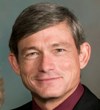By Bob Allen
An international missionary in Zimbabwe said June 11 that Southern Baptists need to worry not only about unreached people groups but also about competition for new converts from other Christian and non-Christian faiths.
“Southern Baptists, would you allow me to challenge us by the reality that in Zimbabwe, for instance, those who are proclaiming a false hope or liberal theology are happily moving into areas that we vacate and outspending us promoting a religion without hope and gods who cannot save?” missionary Gregg Fort asked during a report to messengers at the June 11-12 SBC annual meeting in Houston.
 “Dare we turn over partially conquered ground to Mormons, to Jehovah’s Witnesses, to Muslims?” asked Fort, a second-generation missionary who has served in the sub-Saharan African nation a little smaller than Texas since 1987.
“Dare we turn over partially conquered ground to Mormons, to Jehovah’s Witnesses, to Muslims?” asked Fort, a second-generation missionary who has served in the sub-Saharan African nation a little smaller than Texas since 1987.
“Dare we allow proponents of liberal theology to sneak among our converts through Bible-training programs and seminaries to corrupt the very believers that we have labored to bring to salvation in Christ?” he continued.
Two years ago Fort defended the Zimbabwe Baptist Convention for firing Baptist Theological Seminary of Zimbabwe Principal Henry Mugabe after the Southern Baptist Theological Seminary Ph.D. graduate refused to abide by a directive from a new council named to replace the school’s board of trustees requiring faculty to endorse the 2000 Baptist Faith and Message.
Last year, U.S. groups including the Alliance of Baptists and Lott Carey Missionary Convention switched their longtime support for the seminary to a new Zimbabwe Theological Seminary described as “a Christian institution shaped by Baptist tradition and piety, ecumenical openness and social concern.”
Supporters of Mugabe, who has taught as a visiting professor at Baptist Theological Seminary at Richmond, said the rift resulted from a condition for transfer of the Baptist seminary to Zimbabwe Baptists from the International Mission Board of the Southern Baptist Convention. An IMB official said the Richmond, Va., – based mission board was not involved in the controversy.
Mary Andreolli, minister for outreach and communications for the Alliance of Baptists, declined to comment about Fort’s statement at the SBC.
Alliance and Lott Carey support for the Baptist Theological Seminary of Zimbabwe began in the 1990s after the SBC International Mission Board reoriented priorities so that funds were no longer available for operating such institutions.
When former faculty and others launched the new Zimbabwe Theological Seminary in September 2012, the Alliance pledged to “help give birth” to the new venture.
That included both financial support and collecting books for a new seminary library. Renowned Baptist scholar Glenn Hinson, senior professor of church history and spirituality at the Baptist Seminary of Kentucky, donated his personal library.
The Forts are church planters among the Ndebele people group in a rural area about an hour’s drive from the city of Gweru. Their work began slowly, with only two churches started in several years, but more recently has reportedly taken off.
“Together as Southern Baptists have prayed and often come to labor alongside us through short-term mission trips, we have witnessed our Father reconcile the lost to himself,” Fort told SBC messengers.
“The miracle of new birth has been accompanied by the sick being healed, the demonized being delivered, new believers becoming the Body of Christ in community,” Fort said. “Communities have been transformed and tribal groups have found their animosity toward each other changed into godly love and concern.”
He shared the story of one father who brought his 9-year-old son to them for prayer.
“The family had exhausted all their wealth on traditional healers and false prophets seeking relief for a sickness that made their son appear to be only 5 years old,” Fort said. “He was unable to talk, unable to run, unable even to walk without falling down.
“The parents did give their lives to Christ during a church planting emphasis. They wondered whether the God they now worshipped would be able to heal their son’s body.
“When they brought him to us, he still had the charms around his neck and around his waist. The father was told that they needed to be removed because they represented the power and the authority of our enemy, Satan.
“We watched as he cut them off, built a fire and burned them. And then we gathered around his son … and interceded before the God who is more than able and watched as, even though there were repeated attacks from the enemy, [the youth] was restored to full health and given back to his family.”
Previous stories:
